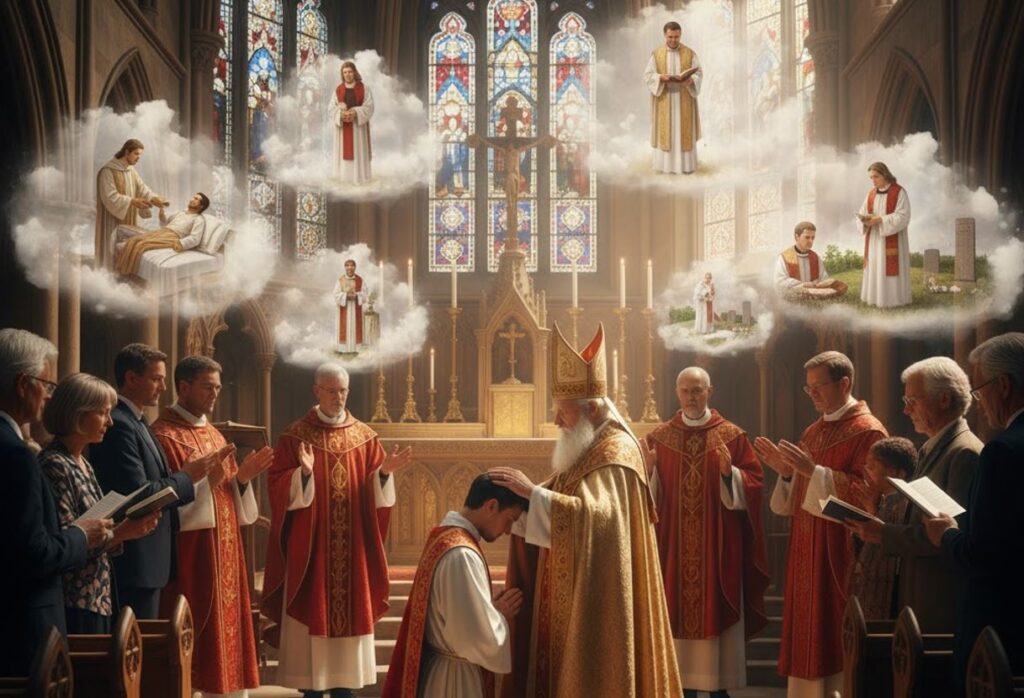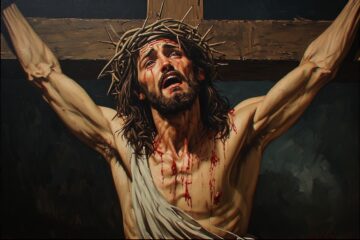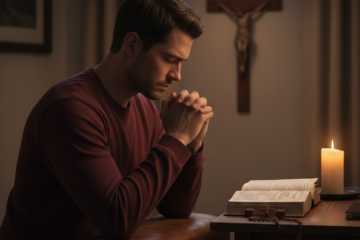A Call to Humble Service and Mission

As a committed Anglo-Catholic and member of the Society of Our Lady of Walsingham, I often find myself drawn to the historical and spiritual depth of the Holy Orders that shape Christian ministry. Lately, I have been prompted to reflect deeply on the Diaconate, the ministry of the Deacon, as it may very well be the path that the Lord is calling me to walk. For this reason, a serious Biblical study is in order, and I invite you to join me!
What exactly is a Deacon? This blog post will explore the question by examining the foundational texts of the New Testament and the enduring wisdom of the Book of Common Prayer (BCP).
The Deacon in the New Testament: The Model of Diakonia
The very name of the office reveals its core function. Deacon comes directly from the Greek word diakonos, which means “servant,” “waiter,” or “minister.” This identity of service is not just a job description; it is a reflection of Christ Himself, who said He came “not to be served but to serve, and to give his life as a ransom for many” (Mark 10:45).
The New Testament provides two key foundational accounts for this ministry:
1. The Appointment of the Seven (Acts 6:1-6)
The practical beginning of the Diaconate is found in the early Church’s first administrative crisis.
- The Need: The Apostles were getting distracted from “prayer and the ministry of the word” by the daily distribution (diakonia) of food to the needy widows.
- The Solution: The community chose seven men “full of the Spirit and of wisdom” (including St. Stephen and St. Philip) to take on the ministry of distribution and welfare.
- The Principle: This event established the Deacon’s role as the servant dedicated to the material and logistical needs of the Church’s community and its mission, thus enabling the spiritual leaders to focus on teaching and prayer.
2. Paul’s Instructions for Godly Conduct (1 Timothy 3:8-13)
St. Paul formally outlines the high moral and spiritual qualities required for this order, showing its importance in the wider Church structure. Deacons must be “dignified, not double-tongued,” managing their households well, and holding the “mystery of the faith with a clear conscience.” This ensures that the Church’s face to the world, the servant of the poor, is one of unwavering integrity.
The Seventy Sent Out: Prototypes of the Servant-Missionary? (Luke 10:1-20)
Before the formal structure of the Holy Orders emerged, Jesus himself established a temporary but powerful ministry of outreach by commissioning seventy (or seventy-two) disciples. Were they Deacons? No, not formally, but they certainly embodied the spirit and mission of the diaconate:
- Sent Out: Like the Deacon, their work was focused outside the inner circle, going “two by two ahead of him to every town and place where he himself was about to go.” This is pure outreach and ambassadorship.
- Practical Ministry: They were to proclaim the Gospel and, crucially, “Heal the sick who are there” (Luke 10:9). This blending of word and sacrificial action is the hallmark of the diaconal calling—service to the afflicted being the living Gospel.
- Humble Dependence: They were sent without purse or bag, relying entirely on God’s provision and the hospitality of others. This is the humility and detachment characteristic of true Christian service.
While the Seventy did not form a permanent order, their mission to prepare the way through practical service and evangelism is a powerful early reflection of the Deacon’s function as an agent of the Kingdom in the world. Vs the priest hood today in new testament times the 70 have similarities of the Deacon role as its outside of the church they were working but in terms of the 70 Jesus sent out, they were performing Exorcisms…which brings me onto a side note on this vs the role of a deacon…
…The Deacon and Exorcism: Clarifying Fictional Liberties of hollywood
It is crucial to distinguish the reality of the Deacon’s ministry from its portrayal in popular culture, such as the film The Rite (which I watched just this weekend gone – bit freaky, so don’t watch if these films irk you or your not of the age to watch as its a 15) In the canonical tradition of the Church (both Roman Catholic and traditional Anglican practice), the Major Exorcism (the solemn casting out of a demon from a possessed person) is a highly specific rite reserved exclusively for a Priest or Bishop who has been formally commissioned by the Bishop. The Deacon, by the grace of his Holy Order, does not possess the specific authority required for this ministry, as it is tied to the authority of the Priesthood to act in persona Christi capitis. While Deacons, as ordinary ministers of Baptism, perform Minor Exorcisms (prayers of protection from evil) within that liturgy, they are strictly excluded from performing the full, solemn rite. The film’s depiction is purely dramatic licence, and a Deacon, as depicted in the film, neither can nor should undertake a Major Exorcism…but instead signpost those who may be troubled to the church to get that sorted – Worthy of note here though, is DONT THINK WE LAY PEOPLE (Non ordained) are completely defenceless in these matters of demonic attack etc (which I actually believe Hollywood is trying to make us believe we are defenceless) – Jesus’ name is powerful and a full and hearty defence as “anyone who calls on the name of the lord WILL be saved” (Romans chapter 10). But we don’t fight alone – hence the help of the Church is always important, for all things. This video on YouTube from Ambassadors of Christ Network explains it very well and resonates with me on this very subject.
| Type of Exorcism | Minister | The Deacon’s Role |
| Major/Solemn Exorcism (Casting out demons from a possessed person) | Priest (or Bishop) | Excluded. |
| Minor/Simple Exorcism (Prayers for protection from evil influence) | Bishop, Priest, or Deacon | Ordinary Minister. |
The Deacon in Liturgy and Ministry: Gifts of Grace
The role of the Deacon in the life of the Church is about a distinctive commission and gifts of grace granted by the Bishop through the laying on of hands. Our BCP (1662) beautifully defines these specific ministries:
Liturgical Gifts (The Altar)
The Deacon’s role at the altar is one of assistance and proclamation, making them a key figure in the Mass (or Holy Communion/Eucharist):
- Proclaiming the Gospel: The Deacon is the ordinary minister for reading or singing the Holy Gospel—the great proclamation of Christ’s life and teaching. This is an honour that underscores their function as a herald of the Word.
- Assisting the Priest: They are commissioned “to assist the Priest in Divine Service, and specially when he ministereth the Holy Communion, and to help him in the distribution thereof.”
- Preparing the Altar: They are responsible for preparing the altar and purifying the vessels after Communion (ablutions).
- The Dismissal: In the historic tradition, the Deacon takes the pivotal role of saying the final Dismissal (e.g., “Go in peace to love and serve the Lord“), sending the faithful back into the world to live out their faith.
Pastoral and Sacramental Gifts (The World)
Outside the sanctuary, the Deacon has specific roles that focus on the Church’s interaction with the world:
- Baptism: They are an ordinary minister of Baptism in the absence of a Priest, a fundamental gateway sacrament.
- Marriages: In some jurisdictions, they may witness and bless marriages.
- Outreach and Care: They are commissioned “to search for the sick, poor, and impotent people of the Parish… that by his exhortation they may be relieved…” This is their distinctive, life-long vocation: to be the “eyes and ears” of the Bishop, bringing the needs of the marginalised to the attention of the Church.
- Funerals: They may preside at funeral services and burials outside of a Requiem Mass.
Modern Titles and Distinction
In the traditional Anglican context, a Deacon is typically addressed as The Reverend Deacon Mr etc or simply Deacon Mr Etc
It is important to recognise the two types of deacons today:
- Transitional Deacon: One who is on the path to becoming a Priest (Presbyter).
- Deacon: One who has been called to remain in the diaconal order for life, dedicating themselves fully to the ministry of service, outreach, and bridge-building between the Church and the needs of the world.
The Diaconate is, therefore, a foundational Ministry of Servanthood. It reminds the whole Church that following Jesus means taking on the towel and basin, seeking out the poor, and bringing the proclamation of the Gospel to bear on the messy realities of the world. This is a profound and vital ministry, and one worth much prayerful consideration.



1 Comment
Elizabeth · 11/26/2025 at 9:16 PM
What’s on my mind? Where do I begin. Firstly an excellent read from both Shaun and David, thank you. Having so much to learn on my path in Christianity one can feel overwhelmed; I thank our heavenly Father for the sacrifice he made through Christ for our sins, and for every day my precious son is well safe and happy.